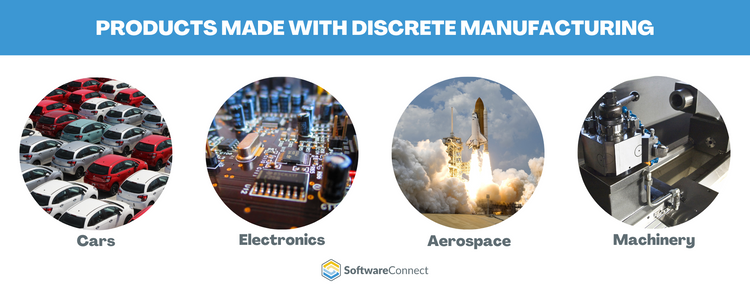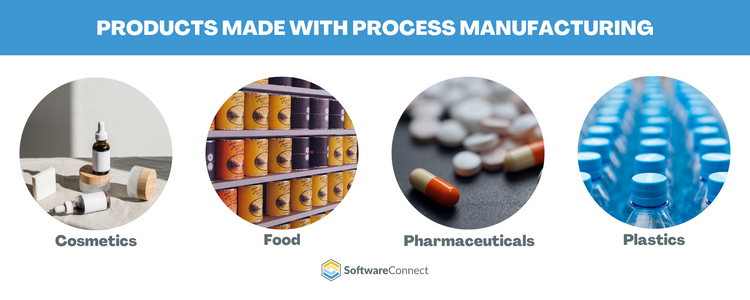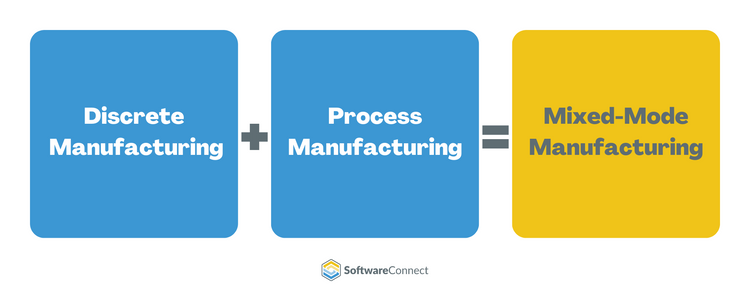Discrete vs. Process Manufacturing
Discrete manufacturing and process manufacturing are two distinct manufacturing methods that companies use to create their products. The method depends on the type of product being manufactured.
Both methods have their own unique set of requirements. Process manufacturing involves using a formula to create a product, while discrete manufacturing involves assembling distinct individual parts into a product. Companies use either one of these methods or a combination of the two, referred to as mixed-mode manufacturing.
What Is Discrete Manufacturing?

Discrete manufacturing is the production of distinct items made by assembling various parts. Components like nuts and bolts are quantifiable in numerical units. This method often uses a bill of materials to guide the product assembly. Discrete manufactured products can be broken down or disassembled into their constituent parts for recycling, reuse, or disposal.
Industries that use the discrete manufacturing method include:
- Automotive
- Electronics
- Aerospace
- Machinery
- Furniture
- Clothing
- Toys
- Defense
- High Tech
- Appliances
An example of a product made with the discrete manufacturing method is a computer. Computer manufacturers use a bill of materials listing the parts needed to assemble a laptop, like electrical parts and screws. The bill of materials also lists the assembly instructions. A computer can be disassembled into its original components for reuse, recycling, or disposal.
What Is Process Manufacturing?

Process manufacturing is the production of goods by combining raw materials to make products. A manufacturer uses a recipe or formula to create each product. In this method, irreversible chemical reactions occur, stopping the product from being able to be broken back down into its original ingredients. Process manufacturing industries include oil and gas, food, pharmaceuticals, metals, and plastics.
An example of a product made with the process manufacturing method is paint. Paint manufacturers use a formula that determines factors such as viscosity, color, and drying time. The formula includes volumes of materials like water and pigments. After these ingredients combine to create the paint, the paint cannot break down into the original raw materials.
What is Mixed-Mode Manufacturing?

Some companies practice mixed-mode manufacturing, where they conduct both process and discrete manufacturing. They use this method when a product requires both assembly and chemical processing. Industries that use mixed-mode manufacturing include consumer packaged goods, chemicals, and industrial machinery.
A cosmetics company is an example of a business that uses the mixed-mode method. It will use process manufacturing to create lipstick and then use discrete manufacturing to assemble the packaging. A formula containing raw ingredients such as pigments, beeswax, and oils is mixed to form lipstick. After combining the ingredients, they cannot be separated. The packaging uses a bill of materials to assemble the lipstick tube, which can be disassembled.
Another example of mixed-mode manufacturing is a vertically-integrated faucet manufacturer that mixes metals into an alloy to form faucet components. The same company will use those components downstream in assemblies of complete products.
Discrete vs. Process Manufacturing Main Differences
There are a few distinct differences between discrete and process manufacturing methods.
Manufacturing Inputs - Process manufacturing combines specific volumes of ingredients to create the finished product. Discrete manufacturing assembles individual parts to make the final product.
Manufacturing Plan - In process environments, manufacturers use a formula or recipe with calculated volumes of raw materials to make each product. Discrete manufacturers use a bill of materials that lists the items needed to create each product and includes instructions for assembly.
Manufacturing Method - In process environments, manufacturers create products by mixing raw materials in batches that undergo chemical reactions through various blending processes. Discrete manufacturers create products by assembling them in a linear process.
Inventory control - Process manufacturing relies on a volume-based inventory control system. In contrast, discrete manufacturing has a precise inventory of individual components.
Product Breakdown - Because products made with process manufacturing are blended and undergo chemical reactions, the final products cannot be broken down into their original raw materials. On the other hand, products made with discrete manufacturing consist of component assemblies that can be broken down into their original parts.
Key Takeaways
| Process Manufacturing | Discrete Manufacturing |
|---|---|
| Made with a formula or recipe | Made with a parts list and instructions |
| Raw materials are blended in batches | Raw materials are assembled |
| Made with measurable volumes of ingredients | Made with countable individual parts |
| Cannot be separated into original ingredients | Can be disassembled or broken down |
| Industries like food and pharmaceuticals | Industries like electronics and automotive |
Software Example: Discrete Manufacturing
Epicor MES provides real-time visibility into production operations and helps streamline production processes. This manufacturing execution system includes tools for quality management, planning, scheduling, and production monitoring. These tools can help discrete manufacturers minimize material waste from the production process. Epicor MES also offers real-time energy monitoring to help optimize energy consumption.
Software Example: Process Manufacturing
For chemical companies in particular, choosing a software solution that will facilitate traceability for hazardous materials is essential. Also, many food and cosmetics companies need to use process manufacturing-specific software for FDA compliance.
BatchMaster ERP is designed specifically for process manufacturers and provides batch processing, formula management, and quality control features. It also includes tools for tracking and tracing raw materials and finished goods.
Software Example: Mixed-Mode Manufacturing
Mixed-mode manufacturers need software that caters to both manufacturing methods. IQMS MES includes discrete and process manufacturing features, including production scheduling, recipe management, and quality control. It also includes tools for managing inventory and supply chain operations.
















